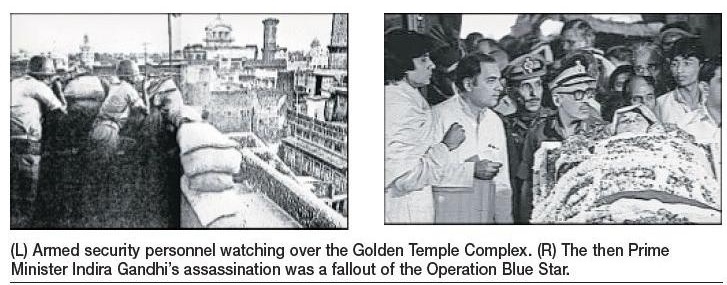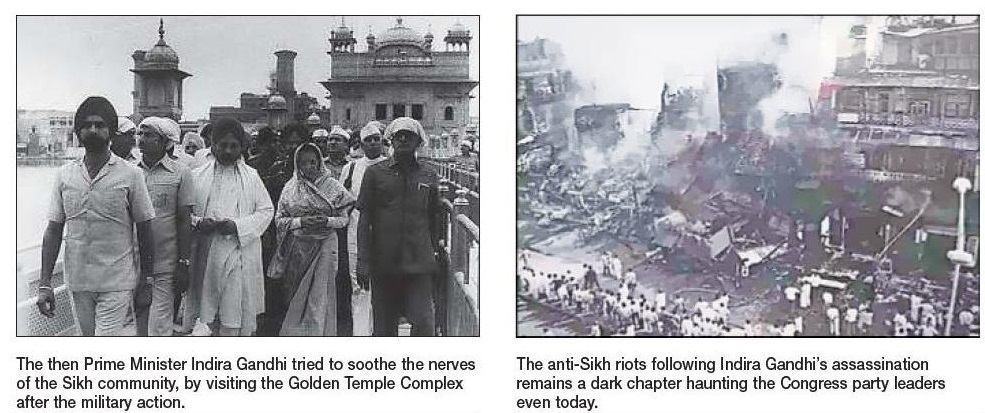Operation Blue Star, Assassination of Indira Gandhi, Anti-Sikh Riots
| Date :31-Jul-2023 |

By Kartik Lokhande :
The Khalistan Files -- IV
As the Khalistani extremism grew, it left the Government of the day in a fix. It had to take some decision. However, the decision of sending in the Army in the holy precincts of the Golden Temple Complex, inflicted a deep scar on the psyche of the Sikhs. Though the operation resulted in elimination of Khalistani terrorists occupying the holy precincts, it triggered a chain of events that disturbed the peace of the country.
There are records mentioning how Rajiv Gandhi and two of his close associates held a number of secret meetings with Akali Dal leaders in New Delhi to convince them to see reason and persuade Khalistani elements to vacate the Golden Temple peacefully. But, the talks failed. Indira Gandhi tried to avoid sending the Indian Army into the Golden Temple Complex, but the situation did not improve. Finally, in June 1984, India witnessed one of the bloodiest chapters in history since independence. The Army launched ‘Operation Blue Star’ to flush out Khalistani terrorists.

It led to heavy damage to the holy precincts, left Bhindranwale and others dead, many civilians and forces personnel also lost their life, and left Sikh community hurt.
The sad chapter fuelled anger among Sikhs and more violence started in Punjab. That was an era of turmoil for Punjab. The unfortunate turn of events led to two of her Sikh security guards assassinating Indira Gandhi on October 31, 1984. It just worsened the situation and what followed was anti-Sikh riots, deteriorating the situation further. Years later, Dr Manmohan Singh, as Prime Minister, apologised in Parliament on behalf of the nation for the wrong done to the Sikhs during the 1984 riots in Delhi. But, the ghost
of its leaders’ involvement in anti-Sikh riots is still haunting the Congress party. As per some accounts, the day Indira Gandhi was assassinated, some of the Khalistanis in the UK headed by Dr Jagjit Singh Chauhan gathered outside the Indian High Commission in London.
They sang, danced, drank and distributed champagne to the passersby. All this disgusted a large section of the British including Margaret Thatcher, the then British Prime Minister. This resulted in temporary phase of co-operation from the British agencies to the Indian counterparts regarding the activities of Khalistanis. The assassination of Indira Gandhi led to tapering off of the US interest in Khalistan operation. After assassination of Indira Gandhi, her son Rajiv Gandhi became the Prime Minister. After a landslide victory in following elections, he reached out to Akali Dal leaders, who were in a grind due to raw feelings in the aftermath of ‘Operation Blue Star’, anti-Sikh riots in Delhi, and rise of Khalistani terrorism. Sant Harchand Singh Longowal of Akali Dal visited Delhi and sought a solution within the framework of the Indian Constitution. After intensive talks, finally the Punjab Accord was signed on July 25, 1985. Various issues were addressed to allay Sikh grievances.
Though this brought some relief, the spate of violence continued till 1993. Sant Longowal was assassinated apart from some Congress leaders and even journalists. General Arun Vaidya, former Army Chief during whose tenure ‘Operation Blue Star’ was undertaken, too was assassinated. Years later, while reflecting upon ‘Operation Blue Star’, former Prime Minister Dr Manmohan Singh told his daughter, “I felt sad as a Sikh that the Golden Temple had to witness these events. But I thought that these people had forced the situation. I think no country can turn a blind eye to secessionist activities.” (Page-308, ‘Strictly Personal: Manmohan & Gursharan’, by author Daman Singh). Pakistan, as expected, continued with its operation and rather came up with a new operation codenamed ‘Operation K-K’ (Khalistan-Kashmir) under which the ISI advised Khalistanis to float NGOs in West Europe to provoke Sikh diaspora there. Khalistanis were brought into contact with fundamentalist organisations like Jamaat-E-Islami of Pakistan, and were asked to co-operate with separatist elements in Jammu and Kashmir.
In 1988, Benazir Bhutto got elected as Prime Minister of Pakistan. She asked Lt Gen Hamid Gul, the then chief of ISI, to stop using Sikh card and hand over to India all Khalistani leaders living in Pakistan. As per the book of B Raman, Lt Gen Gul had replied to her that keeping Indian Punjab destabilised was ‘equivalent to the Pakistan Army having two extra divisions at no cost’. Nawaz Sharif, who later became Prime Minister of Pakistan, also reportedly fomented tensions in India by keeping Khalistan support operations alive. (To be continued)
